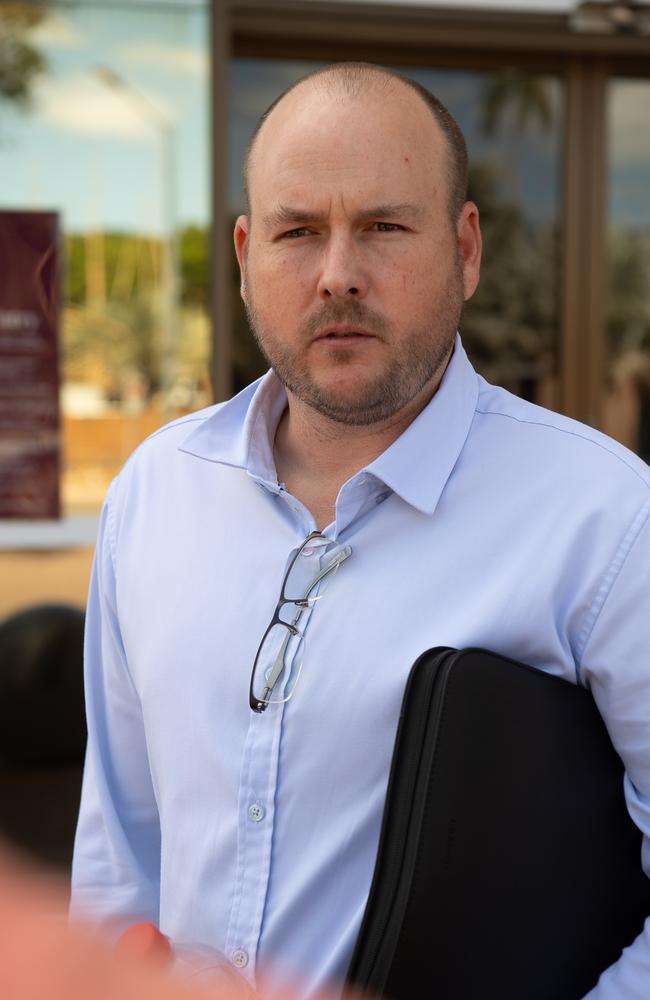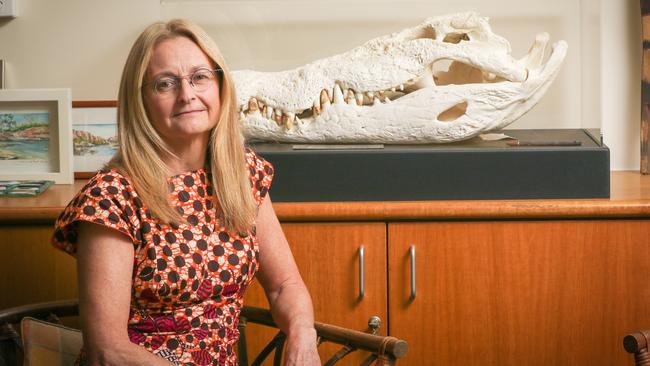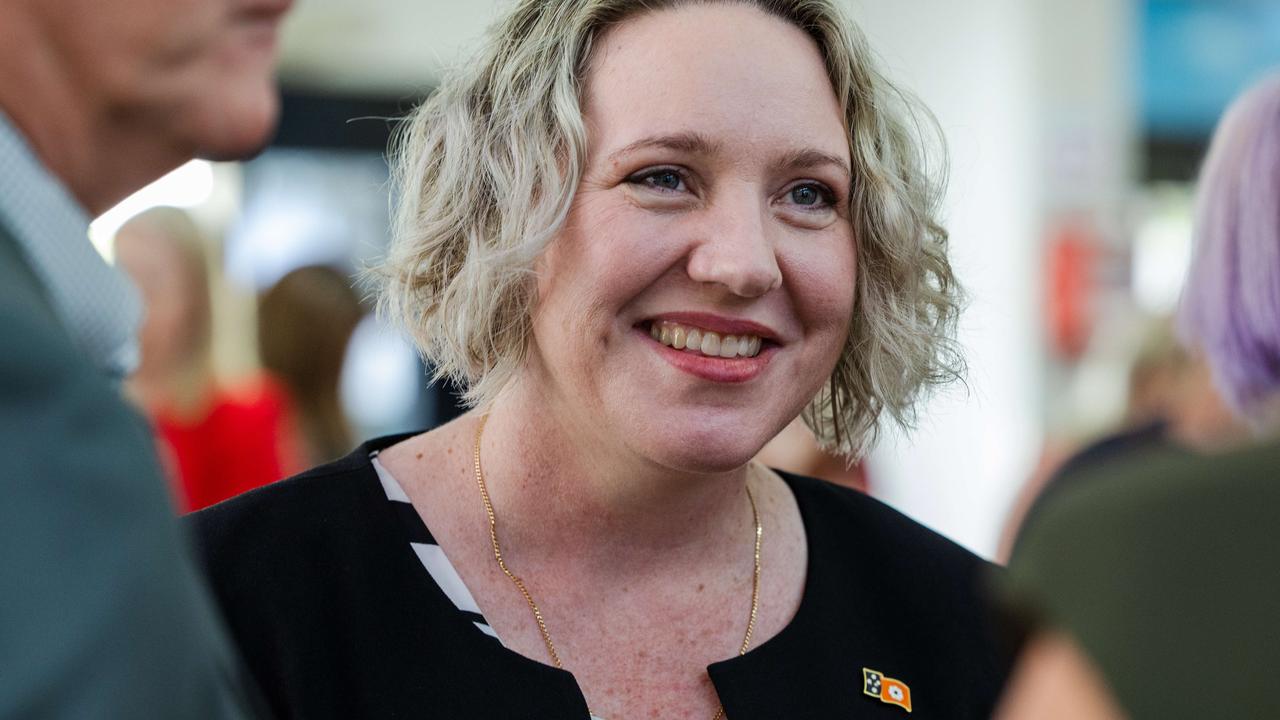Miss Yunupingu inquest: ‘Massive gap’ in services targeting men’s behaviour
A man who repeatedly abused his partner received no targeted help in prison before being released - only to stab her in the heart one month later.

Police & Courts
Don't miss out on the headlines from Police & Courts. Followed categories will be added to My News.
A man who spent years behind bars for repeated and vicious domestic violence assaults never received specific treatment for his offending in prison before being released, only to stab his partner in the heart one month later, a court has heard.
The “massive gap” in initiatives to target men’s behaviour both in and out of prison was exposed in the Territory’s Coroners Court on Friday, during the final day of an inquest into the tragic death of 29-year-old Miss Yunupingu in October 2018.
It was revealed her killer Neil Marika also spent more than two years behind bars after her death before he was assessed for any rehabilitation programs – something that is meant to happen within eight weeks.
This year was the first in a decade there has been any increased funding for prison programs in the Territory, despite the number of inmates jumping by about 800 over the same period.
The court heard chronic understaffing and overcrowding issues in prisons meant corrections enforced strict eligibility criteria for participation in programs, leaving many inmates to be released without any rehabilitation.
Coroner Elisabeth Armitage said it was an “entirely counter-productive” approach.
“It just means the likelihood of further offending is not addressed in any way and we get a revolving door that means increasing demand on limited resources from a soaring prison population,” she said.

NT Correctional Services psychologist Natalie Walker assessed Marika in 2021.
“He denied any responsibility, he said that Miss Yunupingu stabbed herself,” Dr Walker said.
Marika is serving nine years for manslaughter after a plea deal where he admitted to stabbing her three times in a drunken rage.
The warnings about Marika’s attitudes towards his persistently cruel and violent behaviour had been there – a 2011 prison report found he showed “little insight or acceptance of responsibility” and the “level of risk he continues to pose to potential victims” remained strong.
The court heard Marika had participated in some general programs targeting alcohol abuse and domestic violence.
These included a five day program on domestic and family violence, which he undertook after being locked up for a brutal assault that almost killed Miss Yunupingu in 2006.
When back behind bars for a different assault Marika was offered the same program, which he did not complete.
Dr Walker said it was clear the limited interventions available failed to change his behaviour and “certainly didn’t stop him from reoffending”.
“He was offered those programs because that’s what we were able to offer, not necessarily because that was the best program for him,” she said.
Dr Walker said while prison programs were “no silver bullet” it was a “real missed opportunity” Marika had been deemed ineligible for more intensive behaviour change programs during a three-year stint he spent in prison not long before killing Miss Yunupingu.
Counsel assisting the coroner Peggy Dwyer said improving prison programs was a matter of public safety.
“It’s unacceptable, isn’t it, in a community that wants to keep people safe, not to be focusing on programming for Mr Marika,” she said.
Marika will be eligible for parole in October next year.

Alanna Schneider, a former Territory Families case manager who worked closely with Miss Yunupingu and Marika told the court there were “no options” to refer him to behaviour change programs where they had been living in Nhulunbuy.
“It’s a real gap, there’s just nothing,” she said.
“We need a grassroots element, we need strong men who are respected in the community to lead that (men’s behaviour change programs) to give it the strength it needs.”
Engaging respected men in Aboriginal communities to help tackle domestic violence has been a key approach identified by the coroner through the inquest so far.
Gurumin Marika, a relative of Miss Yunupingu and a Yolŋu elder, was one of several family members who sat through each day of the often harrowing inquest and has been asked to help inform recommendations.
“Yolngu mob weren’t talking about what really happened,” he told the court.
“We’ll talk about it back home and come back here and talk about it.”
‘Not just restrictions’: Bottleshops ‘should close’ to address DV crisis
Some of Darwin’s ubiquitous bottleshops should be shuttered to help reduce skyrocketing rates of domestic violence, an ongoing Coronial inquiry into the crisis has heard.
On Thursday, Darwin Aboriginal and Islander Women’s Shelter team leader Lisa Bonaddio told the inquest into the death of Miss Yunupingu both the organisation’s shelters were full.
“We have eight women and 17 children in one of our shelters and its been like that for some weeks,” she said.
“There has been a lot of unassisted turnaways lately, which is a worry.”
Ms Bonaddio said there had been a slight increase in the number of women housed at the shelters in the past financial year, from 440 to 476.
“(But) I think the most concerning was with our critical intervention which was 588 for the year, referrals for women, (up from) 365,” she said.
“I think violence is accepted within our community and also in remote, I think that there’s not enough rehabilitation in prison for offenders.
“I think women want to continue these relationships, they just don’t want the violence.”
DAIWS general manager Regina Bennett, who has been at the service for more than two decades, said the situation had “definitely” deteriorated during that time.
Ms Bennett said while there were many factors driving the spiralling crisis, one was that “there’s too many alcohol outlets in Darwin for sure”
“I think this is the only place in Australia that’s got access to alcohol in every store down the corner, we hear horror stories from on the ground,” she said.
“That’s a huge one, if they cut out (some of the) stores selling alcohol that could be a big improvement – not just restrictions – they need to just cut out a lot of those outlets.”
Ms Bennett said even during the past two years a lack of suitable housing, both in general and for women fleeing violence, had increasingly become “another huge one for us”.
“Probably a couple of years ago we would have the women and children in our crisis centre and then we would move them into our transitional housing units,” she said.
“They would probably stay in there up to 18 months at the most but now there’s a four-to-eight-year wait.
“I think we all forget there’s been a big baby boom in remote communities but we’re not catching up, even to the generations that we should have for housing, so housing is a big one as well.”
The inquest continues on Friday.
Bureaucratic ‘technicality’ meant DV victim fell through the cracks
A “technicality” in the way NT government bureaucrats assessed risk meant a young domestic violence victim fell through the cracks in the weeks before she was killed, a court has heard.
Coroner Elisabeth Armitage is probing the death of the Yolngu woman, known as Miss Yunupingu, at the hands of her partner Neil Marika as part of an ongoing series of inquests into the Territory’s domestic violence crisis.
On Thursday, former member of the Nhulunbuy Family Safety Framework, Jacqui Daniels, told the court Miss Yunupingu had been removed from the NFSF after Marika was jailed for breaching a domestic violence order and was not put back on after he was released in September 2018.
“The framework definitely considered that on and off but felt like they didn’t have enough evidence to show that violence was occurring in the past month in order to be able to make a decision on whether she was experiencing a serious and imminent threat of harm to her life which was the definition of the framework at the time,” she said.
“The most recent violence that happened between Neil and Ms Yunupingu was when Neil assaulted her in front of members of the community and in front of professionals of the community.
“So for me, I felt like that violence was escalating in terms of it being public, in terms of it being known and people in the community felt unable to help, so I felt that he was out of prison, that’s a high risk situation.”
Ms Daniels said the “technicality” meant Miss Yunupingu’s risk score fell from 52 to 33 “if you just did it strictly by the book and only included the last month” before she left for Darwin to be with Marika.
Ms Daniels said she did “everything possible” to try to get the Darwin FSF to accept Miss Yunupingu but “knew that there was a technicality based on the past month scoring that they might not”.
She said she had hoped the DFSF “would go out and try and locate Ms Yunupingu”, with a full non-contact domestic violence order meaning Marika would have been arrested if he was with her.
“I think it was a missed opportunity,” she said.
But Ms Daniels said a new “common risk assessment tool” introduced in 2021 was an “improvement” on the old system.
“I think it encompasses a more holistic view of domestic and family violence from a victim’s perspective,” she said.
“We’re able to count information that has been formally and informally acted on, so not just by the police where there’s been a prosecution but also hearing the story from the victim where she may not have reported to police.
“Also there’s a continuum of risk, meaning she could still be discussed and talked about on the FSF even if the risk is not serious or high, which would make a huge difference in this case.”
Marika was jailed for nine years in 2020 after pleading guilty to Miss Yunupingu’s manslaughter.
The inquest continues.
‘It gutted us’: Ex-cop lashes out on top brass over mental trauma on front lines
A former Territory cop has called “bulls-t” on claims about police welfare, saying the mental trauma of the frontline made officers ill-equipped to fully support chronic domestic violence victims.
On the third day of the coronial inquest into Miss Yunupingu, former Senior Sergeant Daniel Whitfield-Jones said the day he found out about the 29-year-old’s killing was “one of the hardest days of my career”.
Mr Whitfield-Jones was the Nhulunbuy Family Safety Framework chair when the decision was made to remove the 29-year-old from the inter-agency safety plan meetings.

In a frank testimony, Mr Whitfield-Jones said he received no specific domestic violence training from police, and “lacklustre” training from Family Safety Framework.
Coroner Elisabeth Armitage heard that while the average period on the Family Safety Framework was about a month, Miss Yunupingu was considered at “chronic risk or injury or death” for two years.
Mr Whitfield-Jones said in the months before her killing the 29-year-old started to withdraw from services, and was removed from the inter-agency domestic violence working group.
Looking back he said the “white systems” missed an opportunity to engage with the Yolngu leaders, particularly about her abuser’s family – which he suspected were emotionally manipulating her into reuniting with him.
“I forgot to take a breath, step back, and look at it in its totality. I missed the cultural connection,” Mr Whitfield-Jones said.
“As an organisational failing, as a senior sergeant, we missed the boat so many times”.

Mr Whitfield-Jones said the Family Safety Framework should not be chaired by “bureaucrats or anyone in uniform” but by those passionate workers involved in frontline, long-term violence reduction programs.
“We don’t have the expertise, the knowledge, of what chronic domestic violence looks like,” he said.
Mr Whitfield-Jones said Miss Yunupingu was re-referred to the Family Safety Framework, but when her case was transferred over to the Darwin she was rejected.
Within a day of moving to Darwin Miss Yunupingu was back with the man who had ‘tortured’ her for 13 years.
Within weeks she was found on a Palmerston kitchen floor with a knife through her heart.
“The fourth of October is one of the hardest days of my career,” Mr Whitfield-Jones told the coroner as his voice cracked.
“I was so f-king angry.”
“The next meeting I had to go to wawa and tell him his daughter had been killed.”
Mr Whitfield-Jones said the Family Safety Framework team were “inconsolable”, recalling “it gutted us”.
Five years on, he said he still did not understand why the Yolngu woman’s case was not a priority in Darwin – despite a five-year restraining order in place and despite his release from prison, and his decade of abuse.
In 2020 Marika pleaded guilty to her manslaughter and received a nine-year sentence.
Mr Whitfield-Jones said he resigned from the Territory police force four months ago, saying cumulative toll of working in the NT and in Defence “broke the camel’s back”.
He said 2018 – when Miss Yunupingu was killed – was a year of trauma for the Nhulunbuy region.
Mr Whitfield-Jones said there were seven suicides between March and August and 42 attempts, and a cluster of gonorrhoea among 15 young children – the youngest with the sexually transmitted disease only eight.

He said there was also a fatal crocodile attack, a man cut down with a machete in front of his wife, and a 12-year-old boy who “sniffed himself to death in the back of a cruiser” amid a hotspot of volatile substance abuse.
Despite all this, Mr Whitfield-Jones said he was unable to get a psychologist sent to look after his “troops”.
Mr Whitfield-Jones said he “called bullshit” on the talk about police wellness from the top brass, saying only a “minority” truly cared about the front lines.
“I’ve lost colleagues and friends to suicide, relationships have failed …”
The veteran paused and broke down in tears in the witness box, before telling Ms Armitage: “They just have to be better”.
He said this exact same mental trauma made police so ill-equipped to recognise that same toll in long-term domestic violence victims.
“Police shouldn’t be chairing these meetings because we don’t recognise these things (in ourselves),” he said.
“It’s not just the broken bones and black eyes … it’s the mental health injuries.”
’Everyone looks away’: Family’s heartbreak following decade of abuse
A young domestic violence victim said she was brought to the brink of suicide by the pressure from her husband’s family, forcing her to flee her home, a coronial inquiry has heard.
The Territory coroner has been told of the immense pressure on remote domestic violence survivors during the second day of the inquest into the killing of 29-year-old Yolngu woman, Miss Yunupingu.
On Tuesday counsel assisting the coroner Peggy Dwyer said Miss Yunupingu told a Gove women’s crisis centre that she was considering self harm due to the “constant abuse” from her husband’s family.
“She said she felt like self harming … she didn’t want us to stay in town, she said she wanted to be stress free,” Dr Dwyer said.
She said in an act of desperation the long-term domestic violence survivor was willing to leave her north East Arnhem home and fly 1000km to Darwin.

Coroner Elisabeth Armitage was told the Yolngu woman spent just one night in a Darwin shelter, before reuniting with the man who had spent the past 13 years “torturing” her.
Just 23 days later police would find Miss Yunupingu’s lifeless body on the floor of a Palmerston kitchen, after being stabbed through the heart by her husband Neil Marika.
On Tuesday, former Nhulunbuy officer in charge senior sergeant Erica Gibson said she did not understand why Miss Yunupingu — who was considered at “extreme risk of imminent harm or death” — was removed from the Family Safety Framework seven months before her killing.
The former chair of the Nhulunbuy inter-agency body said if the 29-year-old had remained on the Family Safety Framework, her request to leave home “would be almost be grounds for an emergency (meeting)”.
Sargent Gibson said October 2018 was a particularly hazardous time for her, as Marika had only just been released from a 14-stint in prison for breaching a domestic violence order.
“It’s one of the most dangerous periods … because often the offender blames the victim for his incarceration,” she said.
“To ventilate his angst … the fact that the victim has complained, the shame for him and his family … all those things cumulatively made some very high risk situations for a victim survivor.”

The coronial heard that Marika was released into homelessness, and had spent weeks as a long grasser before Miss Yunupingu’s family took him in.
Multiple members of Miss Yunupingu’s family told the coroner they knew a domestic violence order was in place, and that they were scared for her when he started living at the Grey unit.
Her cousin Bilinydjan Wanambi said she was home when the pair burst in while having a drunken argument on the evening of October 4, 2018.
Bilinydjan said Marika yelled out: “I will stab you before I go to jail … and then he started stabbing”.
“We got frightened and scared and ran away,” Bilinydjan said.
“We only heard ‘Help me’.”
Marika pleaded guilty to her manslaughter and received a nine year sentence. He will be eligible for parole in October 2024.
Five years on from her killing, Miss Yunupingu’s bapa (father), aunties and uncles and other loved ones listened quietly to the horrors of the young Yolngu woman’s final moments.
Over the four-part coronial inquiry, Ms Armitage has repeatedly asked what the men in the community were doing to stop this abuse.
“We’ve struggled to understand how this trouble can go on and on and on,” she said.
“And for the women there’s no one they can go to for help, because everyone looks away.”
“Are there strong men who will stand up and say ‘I am watching, and that’s the wrong thing’?”

Miss Yunupingu’s uncle Gurumin Marika told the coroner his heartbreak that his niece was exposed to violence for more than a decade — with neither balanda (non-Indigenous) or Yolngu ways able to protect her.
Gurumin said under “Aboriginal law way” there were two clans — Dhuwa and Yirritja, “like mother and son” — and Marika should have gone to his mother’s clan to face “raypirri” (discipline).
Ms Armitage was told that in the Yolngu culture sensitive women’s or men’s business, including discussing domestic violence, could not be discussed openly.
But Gurumin said his community had to find a way to address the crisis of violence, and promised to consult widely with the Arnhem Land families to propose a solution.
“The way they work is circulating in my mind,” her uncle said.
“How we’re going to deal with this and fix this.”
Since 2000 around 80 Territory women have been killed by a current or former partner, and 94 per cent of the homicide victims have been Aboriginal.
But Ms Armitage said domestic violence was not just a problem for Aboriginal communities — but the whole of Australia.
“Our balanda hospitals have trouble dealing with it, our police are struggling and your Aboriginal culture is also struggling,” she said.




